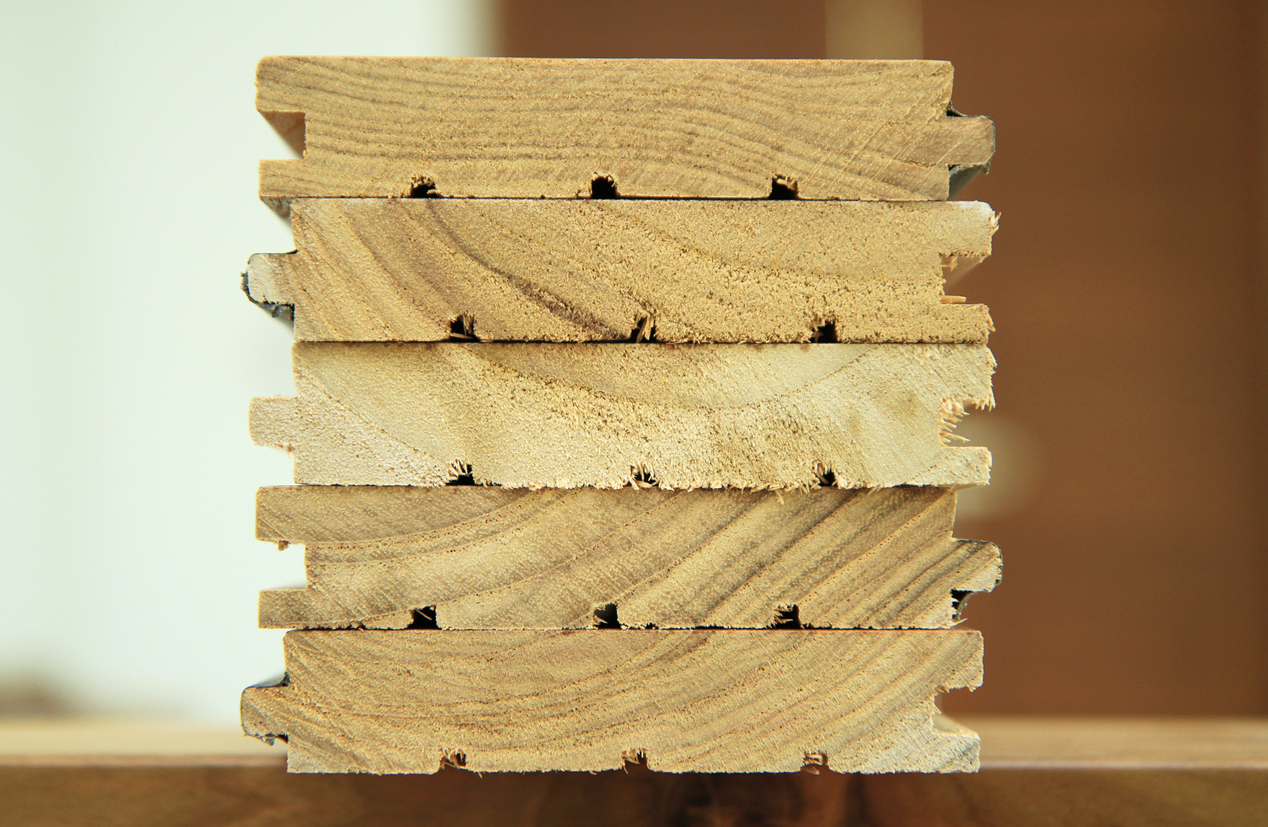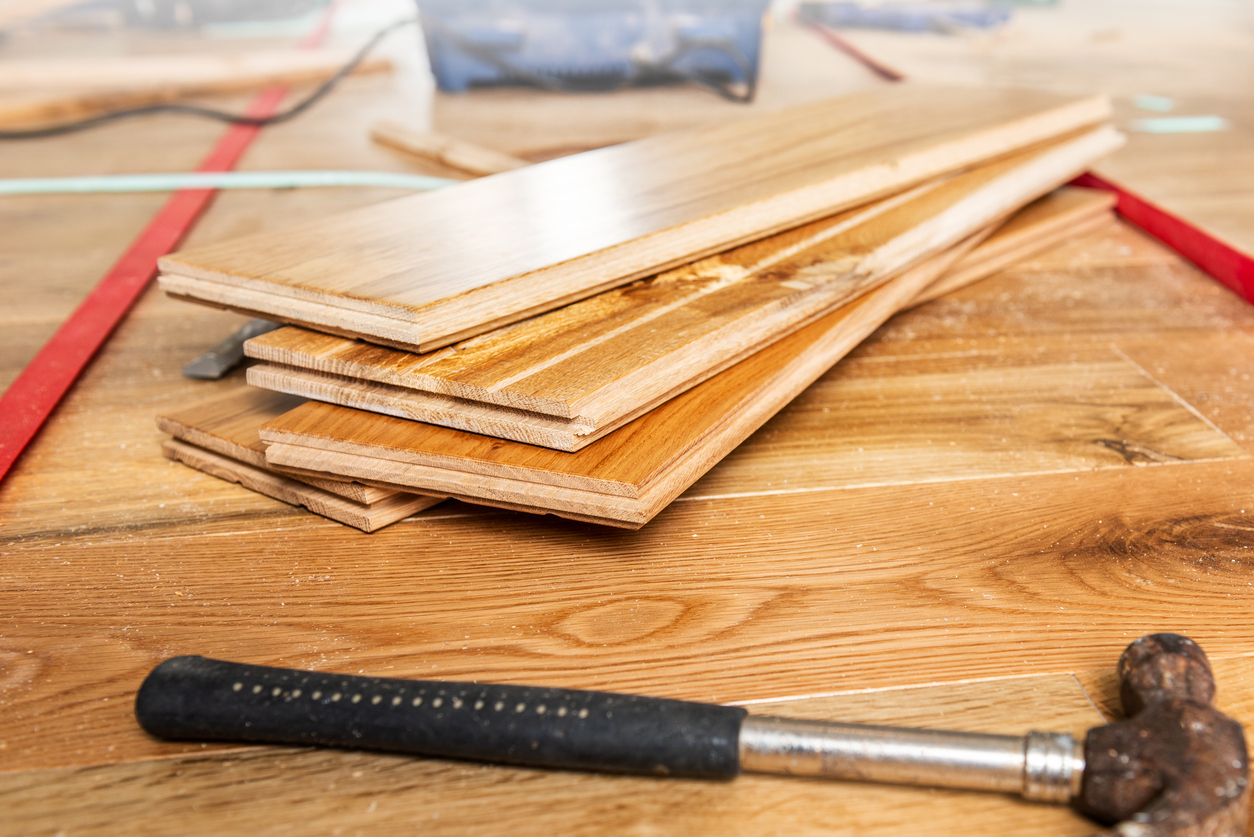Solid vs Engineered Hardwood – Is One Better
Choosing between engineered vs. solid hardwood isn’t just a design decision—it’s a commitment. At a baseline, both bring the beauty and character of real wood. However, each performs differently based on traffic, moisture, and the passage of time.
Before you invest, here’s what you need to know about the best uses for each type of hardwood. And, most importantly, whether one might be better for your home.
What Is Solid Hardwood?
Solid hardwood flooring is precisely what it sounds like: each plank is a single, solid piece of wood, typically 3/4″ thick. Popular domestic species include oak, maple, and hickory.
Each offers a resilient surface that withstands wear and tear, and each delivers a long-lasting flooring solution. With proper care, solid hardwood floors can last up to 100 years.
However, solid wood comes with one concern, and that’s water. Natural wood is porous, making it sensitive to moisture and temperature fluctuations. As a result, it’s best used in stable environments without moisture concerns, such as living rooms and bedrooms.

You Can Refinish Solid Wood Floors Multiple Times
One significant advantage of solid wood floors? You can sand and refinish them multiple times, allowing you to refresh their look repeatedly.
How often? That depends on the plank thickness. With standard 3/4″ solid hardwood planks, you can typically refinish them 4 to 6 times over their lifetime. Each sanding removes a small layer of wood, so the thicker the plank, the more opportunities you’ll have to restore its surface.
What Is Engineered Hardwood?
Engineered hardwood flooring is also 100% real wood. The difference is in the construction.
Rather than using a single piece of hardwood, each engineered plank has a top layer of hardwood. That layer binds to high-density fiberboard (HDF) or plywood core. The multiple layers stack in a criss-cross pattern to give engineered wood better dimensional stability.
This construction makes engineered flooring more water-resistant and able to handle humidity and temperature fluctuations. Consequently, it can handle areas where solid hardwoods struggle, such as basements, kitchens, or over concrete and radiant heat systems.
Some manufacturers like Robbins® even offer waterproof engineered hardwoods such as HydroGuard®. It includes an innovative, three-part system that protects your wood floors from water damage. So, you get 100% waterproof protection with real wood flooring, not laminate or vinyl.

Refinishing Engineered Hardwoods
Like solid wood floors, engineered hardwoods can also be refinished. However, the number of times you can refinish engineered hardwood depends on the thickness of its top veneer layer.
Thicker veneers (around 4mm) let you go through the process once or twice, while thinner veneers (under 2mm) may not be refinishable at all. When considering engineered flooring, check the veneer thickness, as this determines both longevity and maintenance flexibility.
Solid Hardwood vs Engineered Hardwood: Key Differences
Solid and engineered hardwoods may look similar at first glance, but their construction and performance can differ dramatically. Here’s a side-by-side breakdown of how each type stacks up across the features that matter most—durability, cost, installation, and more.
| Category | Solid Hardwood | Engineered Hardwood |
| Longevity | Up to 100 years | 25–40 years |
| Refinishing | 4–6 times | 0–2 times (depends on veneer thickness) |
| Moisture Resistance | Low | Higher – better for kitchens, basements |
| Installation | Nail-down only | Floating, glue-down, or nail-down |
| Style Options | Traditional, available in many species | Wide planks, contemporary styles |
| Cost | Higher material + labor costs | More budget-friendly, easier to install |
| Suitability | Dry, stable environments like living rooms and bedrooms | Versatile – works with radiant heat, concrete subfloors |
| Resale Value | Typically higher | Moderate, depends on quality |
Cost Comparison Between Engineered and Solid Hardwood Floors
Cost is a significant factor in any flooring decision. Solid hardwood flooring typically costs more upfront, both in materials and installation. You’re paying for thick, single-species planks and the labor-intensive nail-down process.
Engineered hardwood offers more budget-friendly options, especially for larger spaces or projects with subfloor limitations. Installation is often faster and less expensive, particularly with floating or glue-down methods. The costs for wide-plank floor options are also typically lower.
Engineered Wood Costs
To quantify, engineered hardwood flooring is slightly less expensive than solid hardwood flooring. Engineered hardwood flooring typically starts at around $4.50 per square foot for click-lock-style planks in wood species such as oak or maple (The Spruce). The typical range of engineered hardwood flooring is $4.50 to $16 per square foot.
Solid Hardwood Costs
Conversely, the cost of solid hardwood can vary significantly depending on the grade of the wood. Solid hardwood flooring can cost between $5 and $28 per square foot (The Spruce). Prefinished solid hardwood flooring is generally less expensive, ranging from $6 to $12 per square foot.
How to Choose Between Hardwood and Engineered Hardwood
Now that you know how solid and engineered hardwood compares, think about what works for your home, budget, and lifestyle. No one type is perfect for every space, so the right choice depends on your specific needs.
- Will the floor be installed below grade or over a concrete slab? If so, engineered hardwood is your best choice due to its stability and resistance to moisture.
- Is your region humid or prone to high moisture levels? Engineered flooring performs better in those conditions, thanks to its layered construction.
- Do you want the ability to refinish your floors in the future? Both types offer this option, but solid hardwood can be refinished four to six times. Engineered hardwood limits you to 2 times, if at all, depending on the veneer thickness.
- Is this your forever home or a shorter-term stay? For long-term value and durability, solid wood floors are often the better fit.
If you’re updating a basement or kitchen, engineered hardwood flooring is the more practical choice. For heritage homes, long-term investments, or maximizing resale value, solid hardwood remains the gold standard.
Robbins® Has You Covered Either Way
In the debate of hardwood vs engineered hardwood, the winner depends on your needs. Solid wood floors bring timeless value and longevity. Conversely, engineered hardwood offers flexibility and performance in areas where solid wood flooring struggles.
Explore our full range of solid and engineered wood flooring options. We offer over 150 selections in various species and finishes, including wire-brushed and hand-scraped options. And check out our latest flooring release, Timber Legends™.
The collection features revolutionary densified wood technology to create a hardened wood flooring product. It outperforms any standard wood flooring option by a substantial margin.

